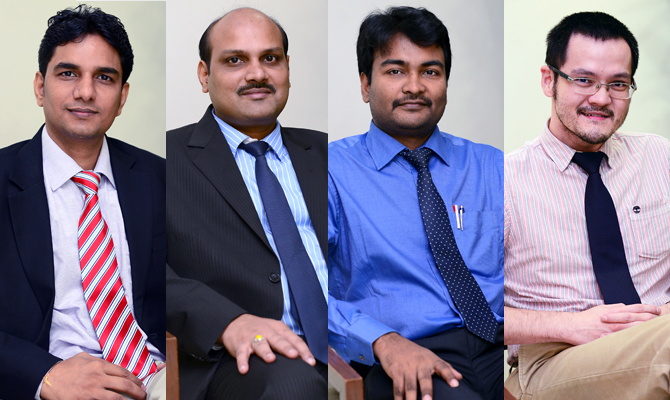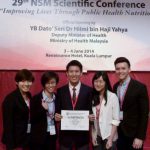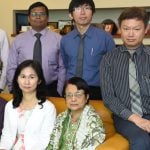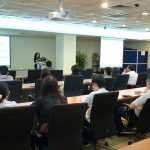Four researchers from International Medical University (IMU) have been successful in securing grants under the Fundamental Research Grants Scheme (FRGS) from the Ministry of Higher Education (MOHE) this year (2015). The total amount of grants approved is RM 495,200.00. The four recipients are Dr Venkata Srikanth Meka, Dr Subrat Kumar Bhattamisra, Dr Ivan Yap Kok Sing, and Dr Rakesh Kumar Tekade. All the researchers are from the School of Pharmacy, IMU. Dr Rakesh Kumar Tekade will be working on his project titled “A Novel Strategy to Overcome Endosomal Degradation of Gene Therapeutics”. Nowadays, many diseases are treated with gene therapy, which is the delivery of gene into a patient’s cells as a drug to treat disease. Natural polymers such as albumin, chitosan, and gelatin have been used to deliver gene therapeutics across the cell membrane. However, the major problem in the delivery of gene therapy is the degradation of the gene in the membrane-bound cell compartments (endosomes) resulting in reduced or no therapeutic effects. Also, the architectural structure of the polymers also does not guarantee complete protection of the gene therapeutics from harsh endolysosomal environment. Dr Rakesh aims to investigate the novel way to overcome endosomal degradation of gene therapeutics using novel nano-polymeric technology. His project serves to find out on how to protect the endosomal degradation of gene therapeutics. Meanwhile, Dr Venkata Srikanth Meka will be investigating on the mechanomutable properties of Ceiba pentandra. Ceiba pentandra gum is a natural biodiversity derived from a plant source that is abundant in Malaysia. Most polysaccharides (carbohydrate molecules) exhibit mechanomutable properties, which have the abilities to change mechanically in strength, stiffness, bonding, or toughness when subjected to physical forces such as stress, temperature, moisture, or pH. This provides an opportunity for conjugation of Ceiba pentandra gum with polymers of opposite charge to form Polyelectrolyte Complexes (PEC). Ceiba pentandra gum thus has the potential to become a prospective pharmaceutical excipient, an inert substance used as a control release polymer in various drug delivery systems. The objective of Dr Venkata’s project is to generate fundamental physicochemical data for Ceiba pentandra gum and to investigate its mechanomutable properties of its PECs with oppositely charged polymers. On the other hand, Dr Subrat Kumar Bhattamisra will be working on a project titled “Antidiabetic Activity of Catalpol on High Fat Diet / Streptozotocin Induced Type-2 Diabetes Mice by Improving Insulin Sensitivity and Mitochondrial Function”. Increasing insulin sensitivity has potentially become an opportunity for preventing and treating type 2 diabetes. Therefore, there is a pressing need to search for an insulin sensitizer having effective, good safety profile, and tolerable for the prevention and treatment of type-2 diabetes mellitus. Catalpol, a natural compound derived from the plants, can exhibit significant hypoglycemic activity in type-1 and type-2 diabetes animals. Dr Subrat’s project is designed to identify and evaluate the role of catalpol on insulin sensitivity in type-2 diabetes induced mice. Ultimately, Dr Subrat’s study aims to identify catalpol as potential insulin sensitizer and also elucidate its mechanism for treating type-2 diabetes mellitus. Last but not least, Dr Ivan Yap Kok Sing will be conducting a study entitled “System Biology Comparison between Mice with Single and Co-infection from Toxoplasma Gondii and/or Trypanasoma Evansi”. Polyparasitism, which is multiple parasitic infections, is widespread throughout many parts of the world and is considered a norm. Interactions between parasites and their hosts are complex and dynamic. Therefore, it is crucial to have fundamental understanding of the mechanisms underlying such parasitic interactions which ultimately can lead to better preventive and control strategies of parasitic diseases. Dr Ivan is working on characterising host-parasite interactions specifically Toxoplasma gondii and Trypanasoma evansi in a murine model. Apart from establishing the complex host-parasite interactions, Dr Ivan’s study is also designed to improve current knowledge on multiple parasite infections and thus, improving treatment approaches and potentially allow the use of probiotics as prevention of parasitic infection. The FRGS aims to support fundamental research that generates new theory, concept, and idea for knowledge enhancement. It involves the exploration of new ideas, concepts or theories which will be the backbone to new discoveries, expansion of knowledge and sophisticated and state of the art inventions. The fundamental research project is generally classified into six areas, namely Pure Science, Applied Science, Social Sciences and Literature, Medical Science, Technology and Engineering, and Natural Science and National Heritage. With the award of the grants, we are confident that IMU researchers will contribute to fulfilling the nation’s aspirations to excel in fundamental research.
Congratulations to all the principal investigators and their co-investigators of the approved projects!









